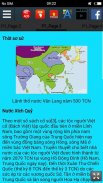










Lịch sử Việt Nam - History of Vietnam

Description of Lịch sử Việt Nam - History of Vietnam
The history of Vietnam can be traced back to around 4000 years ago. Archaeological findings from 1965, still under research, show the remains of two hominins closely related to Sinanthropus, dating as far back as the Middle Pleistocene era, roughly half a million years ago. Ancient Vietnam was home to some of the world's earliest civilizations and societies—making them one of the world's first people who practiced agriculture. The Red River valley formed a natural geographic and economic unit, bounded to the north and west by mountains and jungles, to the east by the sea and to the south by the Red River Delta. The need to have a single authority to prevent floods of the Red River, to cooperate in constructing hydraulic systems, trade exchange, and to fight invaders, led to the creation of the first Vietnamese states approximately 2879 BC. Another truly influential part of history in Vietnam occurred during the late Bronze Age, when the Đông Sơn culture dramatically advanced the civilization. Vietnam's peculiar geography made it a difficult country to attack, which is why Vietnam under the Hùng kings was for so long an independent and self-contained state. The Xích Tỵs and Qins were among the earliest foreign aggressors of Vietnam, but the ancient Vietnamese managed to regain control of the country soon after the invasions.
























